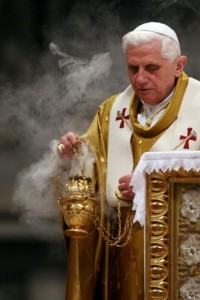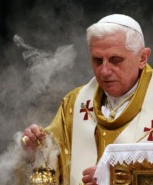The pope may be smelling more heavenly than usual after a new cologne scent was developed exclusively for his use.
The Vatican commissioned celebrity perfume maker Silvana Casoli to invent a cologne for Pope Benedict XVI. The cologne will not be available in stores; it will be worn only by the pope.

Casoli has also developed scents for other prominent public figures, such as King Juan Carlos of Spain, Madonna and Sting.
The Rev. Erich Rutten, St. Thomas’ chaplain and Campus Ministry director, said from his knowledge of the pope, the new cologne doesn’t come as a surprise.
“From what I’ve read about (the pope), he’s a very aesthetic person. In that way, it’s not a surprise,” Rutten said, “but it’s clearly not on the forefront of the (Catholic) church’s agenda.”
How the pope smells may seem insignificant to some, but Rutten said it should not automatically be deemed a bad thing.
“A cologne is not necessarily a bad thing. It can be a celebration of a sense of smell,” Rutten said.
However, St. Thomas alumnus Chris Wille said he doesn’t agree with the decision to make the cologne for the pope because it may call too much extra attention to him.
“It seems like a publicity stunt, and the pope shouldn’t have publicity stunts. He’s the pope,” Wille said.
On the other hand, sophomore Nathaniel Binversie is surprised by the pope’s new cologne but said he can see good things coming out of it.
“With all the imagery and smells of the Catholic Church that we use for centering and entering into a peaceful atmosphere with God, it makes you think it’s a good way that he could center himself,” Binversie said.
Senior Ben Schmitz agreed and said for a Catholic, humans are made with senses to use them to glorify God.
“There are many ways to misuse the senses, but this does not mean that one should use them as little as possible,” Schmitz said, “If prudent judgment allows one to spend money and resources encouraging artistic works, then go for it.”
Schmitz said that Catholics may see the perfume as a way to connect the senses and divine gifts.
“The senses are a gift, and a gift ought to be received,” Schmitz said.
Freshman Lauren Buchholz agrees that this should not be looked at as something negative.
“It would be one thing if the fragrance was to be available in stores with the pope’s face on it,” Buchholz said, “but he isn’t trying to make money off of it.”
Junior Vinnie Floeder is not sure why the pope decided to have a fragrance made but said the pope “can do what he wants.”
“Who am I to question his decision?” Floeder said.
Caroline Rode can be reached at rode8318@stthomas.edu.




As long as they name the cologne “Hypocrisy”, I’m all for this.
100% agreed, Chris.
Care to elaborate on what you mean, Chris? (Preferably not an ad hominem response.)
Ryan – there is nothing hypocritical to you about the leader of Catholicism sitting on a golden throne, in a palace, with bank accounts estimated in the billions, having a perfume (that the church paid for) that was exclusively made for him sprayed on him? While tens of thousands of children die every day from hunger and a lack of basic healthcare?
Dan summed it up nicely. Though when you derive your doctrine from an incoherent book of fairy tales, I guess anything goes.
Dan, I see where you’re coming from but I think your criticisms miss some important things. Speaking of the Church’s art and buildings as a whole, the purpose of building magnificent cathedrals and what not is to draw one’s mind towards the good, the beautiful, and to God. They serve an important purpose in feeding the human hunger for goodness and beauty.
As far as it concerns the Pope, none of the religious art or artifacts that he uses belongs to him; they’re treasures of the Church as a whole. The staff, the big hat, the sumptuous vestments, the golden throne — none of it is for the Pope’s own glory, but is to set him apart and distinguish him as a figure of authority and the steward of Christ’s church. Also worth noting: those bank accounts aren’t the Pope’s. They’re part of the Vatican bank and go to support the Church’s missionary and charitable work throughout the world.
Over and above all these things, to suggest that the Pope isn’t concerned with the poor and the suffering is a completely unfounded and inaccurate claim. While much of Benedict’s work isn’t directly involved in serving the poor, he and the other bigwigs in the Vatican are eminently concerned with how the Church’s mission to feed and clothe the needy is being accomplished.
So often people look at the splendour of Rome and how well-off the Pope seems, and completely ignore the fact that the Roman Catholic Church, with all of its Mother Teresa’s in places like Africa, South America, etc., is one of the largest, if not –the- largest, charitable organization on the planet.
As for this whole cologne thing, I’m not really sure what to think of it.
@ Chris – Come on, that comment is about as cliché and unfounded as they come. Christianity and its “incoherent book of fairy tales” has been the singularly most influential force in shaping much of the world over the past two thousand years.
Well said, Ryan.
The money of the Church goes literally all around the world, from Catholic Charities to humanitarian efforts to local parishes. I don’t know what to think about the cologne thing either, but I’m sure it isn’t out of vanity. If you’re going to disagree with the Church, let’s hear it, but I don’t think attacking a little thing like the Pope’s cologne is the best place to start.
Ryan – I have to disagree on the bible being the most influential force in the world over the last two thousand years – for that, I’d turn to the scientific method and the exchange of free thought, two things that religious leaders fought (and even killed people over) for a long, long time.
As to the church’s concern for the poor and hungry, I think its tough to argue that it is anywhere near the top of their priority list. Reproduction issues and gay marriage are the only arenas in which the church (and its followers) inserts itself loudly and regularly. You don’t hear the bishops railing against the wars, supporting universal healthcare, fighting for the environment, or decrying the state of malnourished, dying children all over the globe very often, if at all. These are all issues specifically mentioned in your Bible by Jesus, and yet we hear no call to action on them from the church’s leaders. Instead, we hear about how gay marriage is an abomination, and how it is sinful for adults in Africa to use condoms; a region where disease and famine ensure millions of children will die every year.
Sure, the church is concerned with the poor and hungry. It’s just not anywhere near as important as inserting themselves in other people’s private lives, apparently.
I’m sorry Ryan, I’m having a little trouble seeing how Christianity’s influence has anything to do with its veracity. Is there a rule somewhere that if you get enough followers, you’re exempt from providing evidence for your claims? Or for that matter, from explaining the crimes against humanity allegedly perpetuated by your god…
“It can be a celebration of a sense of smell”
“it’s a good way that he could center himself,”
“perfume as a way to connect the senses and divine gifts”
Kinda seems like the Pope could take a poop in the middle of the street and Catholics around the world would jump to his defense with any excuse they could think of. “Our bodies were created by God and excrement is completely natural and healthy, the pope was glorifying God by using the great gift of bowel movement.”